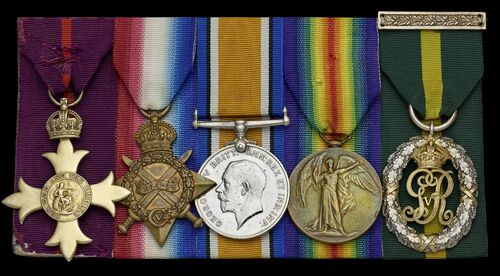
Auction: 24001 - Orders, Decorations and Medals
Lot: 155
A Great War O.B.E. group of five awarded to Lieutenant-Colonel G. W. Fitzgerald, Royal Army Medical Corps
The Most Excellent Order of the British Empire, Officer's (O.B.E.) 1st Type breast Badge, Military Division, silver-gilt; 1914-15 Star (Major G. W. Fitz-Gerald. R.A.M.C.); British War and Victory Medals (Major G. W. Fitz-Gerald); Territorial Decoration, G.V.R., silver-gilt, hallmarked for London, pitting, minor edge bruising, very fine overall (5)
O.B.E. London Gazette 3 June 1919.
T.D. London Gazette 13 July 1920.
Gordon William Fitzgerald was born at Trinidad, West Indies on 10 March 1872. Educated at Edinburgh he graduated in 1898 and undertook postgraduate training at Rotunda Hospital, Dublin. Fitzgerald finally became a Medical Doctor in Edinburgh in 1901 and appears on the census that same year working as an assistant to a Doctor Malloy in Blackpool.
Opening his own Obstetric and Gynaecological practice in Manchester he was commissioned Lieutenant the Royal Army Medical Corps (Volunteers) on 4 January 1905. He was transferred with that rank into the 3rd (East Lancashire) Field Ambulance on 1 April 1908 and later posted as Captain to the 1st (East Lancashire) Field Ambulance. During this time Fitzgerald was living at 183 High Street, Manchester and running his practice in the local area, however all that was to change with the outbreak of the Great War and the mobilisation of the reserves.
Fitzgerald was mobilised in August 1914 and advanced Major on 18 September, the same month he arrived in Egypt. Joining Kantara Hospital in November 1914 he arrived with his unit at 'W' Beach, Gallipoli on 11 May 1915. In the unsanitary conditions on the beaches he did not last long before falling ill, being evacuated sick on 26 November.
After the evacuation of Gallipoli Fitzgerald joined his unit aboard the steamer Transylvania at Alexandria on 23 February, bound for France. It is uncertain how long he remained in France however as Fitzgerald was ordered back to Britain to command the Fusehill War Hospital, Carlisle.
This was to be a 400 bed hospital based in a former workhouse, which opened on 16 October 1917. Several nearby schools were also converted and as a result the total number of beds was 650. During the war Fusehill treated 9,809 patients although it had a poor reputation with many patients feeling poorly looked after. This apparently reflected the general amenities rather than the medical care, especially the food which was the subject of an inquiry.
Fitzgerald was demobilised on 4 May 1919 and returned to work in Manchester where he received an appointment to the Municipal Hospital. A longtime member of the Obstetric and Gynaecological Society he served as its President for an extended period. Still working at the outbreak of the Second World War Fitzgerald was placed in charge of Didsbury Military Hospital.
This role was to be his last as Fitzgerald died on 18 August 1944 at Manchester; sold together with copied research comprising census data, medical register listings, an extracts from Lives of the Fellows, London Gazette entries and a News&Star article on the Fusehill hospital as well as handwritten research and a photocopied Fellow's certificate.
Subject to 20% VAT on Buyer’s Premium. For more information please view Terms and Conditions for Buyers.
Sold for
£420
Starting price
£270




